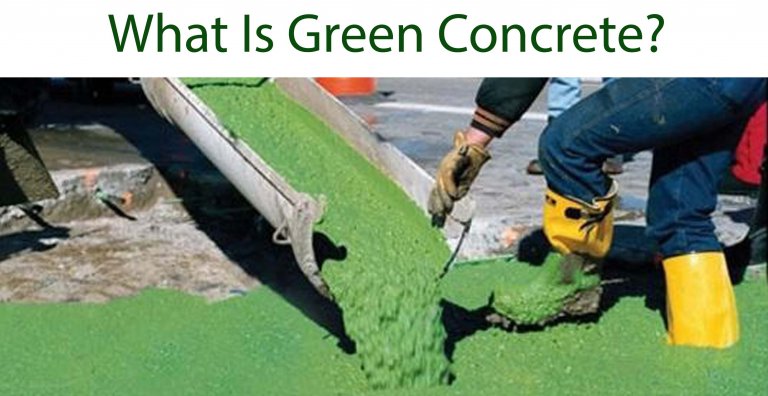A concrete that uses less energy in its production and produces less carbon dioxide than normal concrete is green concrete.Green Concrete is taken to mean environment-friendly concrete.

Why Green Concrete?
The main ingredient in concrete is cement and it consists of Limestone (Calcium Carbonate CaCO3). During manufacture of cement, its ingredients are heated to about 800 – 10000 C. During this process the Carbon Dioxide is driven off. Approximately 1 kg of cement releases about 900 gms of Carbon Dioxide into the atmosphere. Therefore, green concrete came into existence to reduce the emission of carbon dioxide.
Materials for Green Concrete
1- Locally available:Construction materials, components, and systems found locally or regionally, saving energy and resources in transportation to the project site.
2- Salvaged, re-furnished, or re-manufactured:Includes saving a material from disposal and renovating, repairing, restoring, or generally improving the appearance, performance, quality, functionality, or value of a product.
3- Reusable or recyclable:Select materials that can be easily dismantled and reused or recycled at the end of their useful life.
4- Recycled Demolition Waste Aggregate
5- Recycled Concrete Aggregate
6- Blast furnace Slag
7- Manufactured Sand
8- Glass Aggregate
9- Fly ash
Mix Design
1- Optimizes void space between aggregates by optimizing particle proportions and packing of materials. This makes more effective use of the cement binder.
2- Aggregates replace excess cement paste to give improved stability, less shrinkage and increase in strength and durability.
3- Less cement also generates less heat of hydration.
4- The slump of the concrete and its flow are a function of the shape and the quantity of the predominant size of the aggregate in the mix.
5- Use of more fine aggregate gives higher slump and flow. So the optimum proportions of coarse and fine aggregate must be critically found to have the best and dense concrete in both fresh and hardened stage of concrete.
Improved Properties
1- Mix can result in a reduced paste volume within the concrete structure resulting in a higher level of protection against concrete deterioration.
2- Higher strength per kilogram of cement
3- Increased durability and lower permeability
4- More aggregates typically mean higher Modulus of elasticity.
Advantages
1- User-friendly
2- Optimized mix designs mean easier handling, better consistency and easier finishing
3- Reduction in shrinkage and creep
4- Green Concrete uses local and recycled materials in concrete.
5- The heat of hydration of green concrete is significantly lower than traditional concrete
6- This result in a lower temperature rise in large concrete pours which is a distinct advantage for green concrete.


